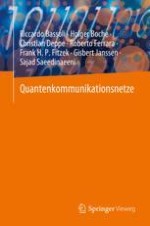2023 | OriginalPaper | Buchkapitel
4. Quanteninformationstheorie
verfasst von : Riccardo Bassoli, Holger Boche, Christian Deppe, Roberto Ferrara, Frank H. P. Fitzek, Gisbert Janssen, Sajad Saeedinaeeni
Erschienen in: Quantenkommunikationsnetze
Aktivieren Sie unsere intelligente Suche, um passende Fachinhalte oder Patente zu finden.
Wählen Sie Textabschnitte aus um mit Künstlicher Intelligenz passenden Patente zu finden. powered by
Markieren Sie Textabschnitte, um KI-gestützt weitere passende Inhalte zu finden. powered by
